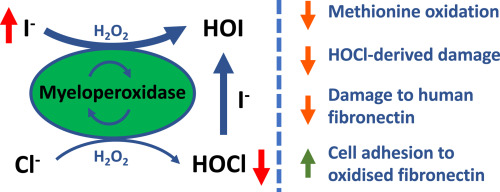Hypochlorous acid, the main myeloperoxidase-derived oxidant, is bactericidal, but also damages host tissue. Hypochlorous acid is one of the factors that destroys periodontal tissue in periodontal disease. This destruction is what eventually leads to loose teeth and tooth loss. When enough iodine is present in the organism, however, hypoiodous acid substitutes for hypochlorous acid. The former greatly decreases MPO-mediated damage to host tissue, amongst other beneficial actions:Interesting. I should probably know this, but I wasn't aware Iodine was good for oral health.
P.S. Would you mind sharing or pointing to your routine with iodine for periodontal disease?

Iodide modulates protein damage induced by the inflammation-associated heme enzyme myeloperoxidase
Iodide ions (I−) are an essential dietary mineral, and crucial for mental and physical development, fertility and thyroid function. I− is also a high …
Oxidation of I− by Compound I of MPO is only marginally slower than for SCN−, and the resulting hypoiodous acid (HOI) has a much lower redox potential than HOCl (0.78 vs 1.28 V). Thus HOI would be expected to be both selective and less damaging than HOCl [47]. Several experimental and epidemiological studies have provided evidence for a protective effect of I− in cardiovascular disease, but the underlying biochemical mechanism(s) are unclear [48]. Low urinary I− concentrations have been associated with coronary artery disease in the North American National Health and Nutrition Examination Study (NHANES) [49], and recent work has shown that I− can protect heart tissue against reperfusion injury-induced damage in a murine model [50]. This has been proposed to be due to metabolic changes [50], but MPO has also been strongly associated with reperfusion induced tissue injury as a result of neutrophil accumulation and activation after O2 deprivation [51]. A role for I− in modulating MPO-induced damage has poorly studied probably as a result of its low systemic concentration ( < 1 μM for I−, 100 mM for Cl−, 20–80 μM for SCN−) [52], though there is abundant evidence that I− levels can be significantly elevated by interventions [53,54]. In the light of these data, we hypothesised that I− might reduce oxidative damage induced by MPO, when I− levels are elevated over typical physiologic levels. Here we provide evidence in support of this hypothesis, with increased I− concentrations modulating protein damage induced by MPO. These findings illustrate the potential of I− to minimize damage associated with MPO-mediated damage and chronic inflammation.
The routine I use is very simple: 150mg (3 drops) of SSKI daily, with additional topical application when the rare gingival abscess manifests. If I feel that a tooth is overly infected (or if I have a cold) I take up to a gram or more of SSKI for a few days. But this is rarely needed.
